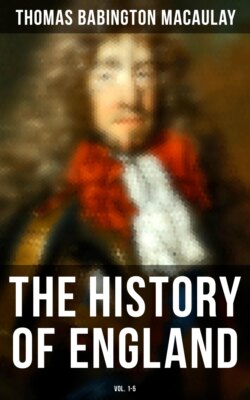The History of England (Vol. 1-5)

Реклама. ООО «ЛитРес», ИНН: 7719571260.
Оглавление
Томас Бабингтон Маколей. The History of England (Vol. 1-5)
The History of England (Vol. 1-5)
Table of Contents
VOLUME 1
CHAPTER I
CHAPTER II
CHAPTER III
CHAPTER IV
CHAPTER V
VOLUME 2
CHAPTER VI
CHAPTER VII
CHAPTER VIII
CHAPTER IX
CHAPTER X
VOLUME 3
CHAPTER XI
CHAPTER XII
CHAPTER XIII
CHAPTER XIV
CHAPTER XV
CHAPTER XVI
VOLUME 4
CHAPTER XVII
CHAPTER XVIII
CHAPTER XIX
CHAPTER XX
CHAPTER XXI
CHAPTER XXII
VOLUME 5
CHAPTER XXIII
CHAPTER XXIV
CHAPTER XXV
Отрывок из книги
Thomas Babington Macaulay
Published by
.....
The two parties were still regarding each other with cautious hostility, and had not yet measured their strength, when news arrived which inflamed the passions and confirmed the opinions of both. The great chieftains of Ulster, who, at the time of the accession of James, had, after a long struggle, submitted to the royal authority, had not long brooked the humiliation of dependence. They had conspired against the English government, and had been attainted of treason. Their immense domains had been forfeited to the crown, and had soon been peopled by thousands of English and Scotch emigrants. The new settlers were, in civilisation and intelligence, far superior to the native population, and sometimes abused their superiority. The animosity produced by difference of race was increased by difference of religion. Under the iron rule of Wentworth, scarcely a murmur was heard: but, when that strong pressure was withdrawn, when Scotland had set the example of successful resistance, when England was distracted by internal quarrels, the smothered rage of the Irish broke forth into acts of fearful violence. On a sudden, the aboriginal population rose on the colonists. A war, to which national and theological hatred gave a character of peculiar ferocity, desolated Ulster, and spread to the neighbouring provinces. The castle of Dublin was scarcely thought secure. Every post brought to London exaggerated accounts of outrages which, without any exaggeration were sufficient to move pity end horror. These evil tidings roused to the height the zeal of both the great parties which were marshalled against each other at Westminster. The Royalists maintained that it was the first duty of every good Englishman and Protestant, at such a crisis, to strengthen the hands of the sovereign. To the opposition it seemed that there were now stronger reasons than ever for thwarting and restraining him. That the commonwealth was in danger was undoubtedly a good reason for giving large powers to a trustworthy magistrate: but it was a good reason for taking away powers from a magistrate who was at heart a public enemy. To raise a great army had always been the King's first object. A great army must now be raised. It was to be feared that, unless some new securities were devised, the forces levied for the reduction of Ireland would be employed against the liberties of England. Nor was this all. A horrible suspicion, unjust indeed, but not altogether unnatural, had arisen in many minds. The Queen was an avowed Roman Catholic: the King was not regarded by the Puritans, whom he had mercilessly persecuted, as a sincere Protestant; and so notorious was his duplicity, that there was no treachery of which his subjects might not, with some show of reason, believe him capable. It was soon whispered that the rebellion of the Roman Catholics of Ulster was part of a vast work of darkness which had been planned at Whitehall.
After some weeks of prelude, the first great parliamentary conflict between the parties, which have ever since contended, and are still contending, for the government of the nation, took place on the twenty-second of November, 1641. It was moved by the opposition, that the House of Commons should present to the King a remonstrance, enumerating the faults of his administration from the time of his accession, and expressing the distrust with which his policy was still regarded by his people. That assembly, which a few months before had been unanimous in calling for the reform of abuses, was now divided into two fierce and eager factions of nearly equal strength. After a hot debate of many hours, the remonstrance was carried by only eleven votes.
.....